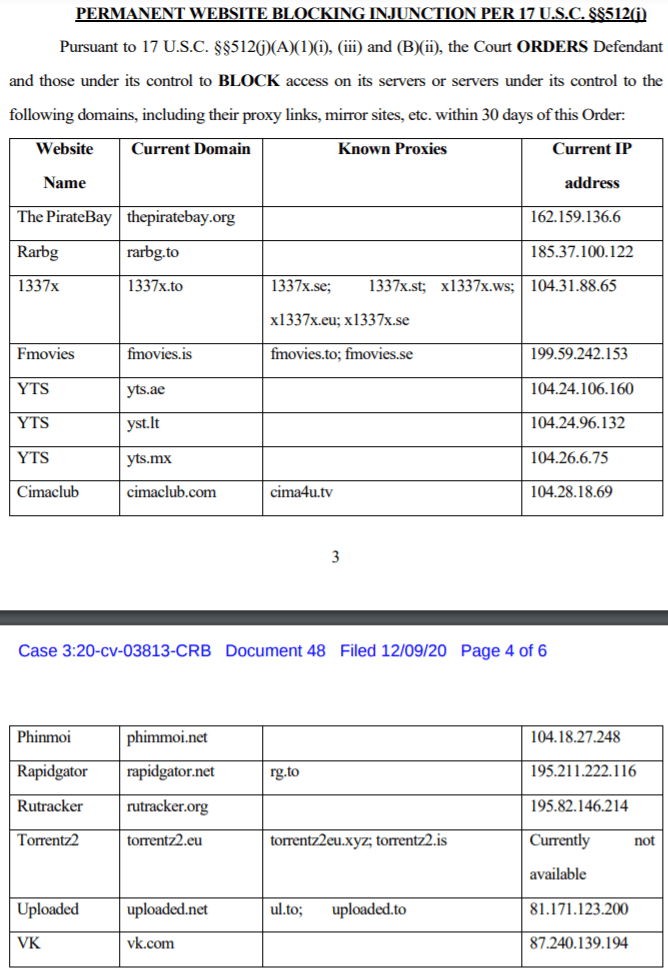 Back in June, Hurricane Electic, one of the major network providers and operator of the largest IPv6 backbone, took action to prevent damage to its business.
Back in June, Hurricane Electic, one of the major network providers and operator of the largest IPv6 backbone, took action to prevent damage to its business.
Hurricane provides services to large Internet-focused businesses, including ISPs, which in turn have thousands of customers, all of whom are free to use their connections as they wish. However, a group of movie companies, all of which are known for filing copyright complaints in pursuit of settlement, tried to argue that Hurricane is responsible for the actions of its customers.
After obtaining a subpoena, a law firm acting for the companies behind Rambo: Last Blood, London Has Fallen, Dallas Buyers Club, The Hitman’s Bodyguard, and many others demanded that Hurricane should hand over the personal details of its allegedly pirating customers.
In response to persistent demands, including to disconnect allegedly infringing customers and pay damages in excess of $500,000, Hurricane Electric filed two lawsuits, one in California and one in Nevada, seeking a declaratory judgment stating that it is not responsible for the infringements of its customers. Or those of their customers. Or their customers’ customers.
Amended Complaint Filed in August 2020
In August, Hurricane Electric (HE) filed an amended complaint which in part described the alleged business model of the movie companies targeting its business.
“HE is informed and believes and based thereon alleges that multiple Defendants, many of which share the same addresses, managing agents, and/or agents for service, are copyright assertion entities in the business of generating income primarily from threats of infringement lawsuits against legitimate technology companies that have nothing to do with any alleged infringements by unnamed end users of Internet connections,” HE wrote.
Describing the defendants as “mere shells” for generating income via threats of copyright infringement lawsuits, HE stated that the move companies have become frustrated by courts awarding limited damages against individual file-sharers so have adopted a new business model of suing entities, like HE, that are “higher up the food chain.”
With the main case still rumbling on, an interesting third-party complaint appeared on the docket this week. Featuring Killing Link Distribution LLC, one of the defendants in the HE case and the company behind the Nicholas Cage movie Kill Chain as plaintiff, it targets Sophidea Inc., an Internet service provider.
Third Party Lawsuit Against a Hurriance Electric Customer
While the company was the subject of several headlines in 2014, little is known about Wyoming-based Sophidea. The third-party lawsuit (filed by Culpepper IP, the same law firm that obtained user data from YTS) says that Sophidea is an ISP operating in California that buys Internet access, IP address and co-location services from Hurricane Electric.
The complaint further states that the ISP operates a VPN service through HE, enabling its customers to access the Internet via HE IP addresses. According to Killing Link, users of Sophidea’s VPN service accessed “illicit notorious piracy websites” to download and share pirated copies of movies.
“Particularly, Defendant’s users have used this VPN service to download torrent files of Plaintiff’s Work, and pirate Plaintiff’s Work on the Internet via the BitTorrent Protocol Client throughout the world,” the complaint notes.
Among the sites allegedly accessed by Sophidea’s customers are YTS, The Pirate Bay, RARBG, 1337x, Fmovies, Cimaclub, RuTracker, and Torrentz2. Interestingly, Killing Link further claims that users also accessed file-hosting sites Rapidgator and Uploaded, plus Russian social networking site VK “to engage in massive piracy”. How this information was obtained isn’t revealed.
“Defendant [Sophidea] continued to provide network connections to its users despite receiving notices indicating that Defendant’s users were using the network connection to engage in piracy via, for example, one or more of the above piracy websites,” the complaint reads.
The third-party complaint does not seek damages. Instead, the movie company requests preliminary and permanent injunctions to prevent Sophidea from continuing to provide customer access to “infringing material or activity residing at particular online sites.”
Complaint Quickly Concludes With Proposed Stipulated Injunction
On the very same day that the complaint was filed at a California court, a new document appeared on the docket revealing that everything had been sorted out between the parties. A quick turn around, certainly. But it’s the details of the agreement that are likely to raise eyebrows.
According to the stipulated injunction and dismissal, Sophidea provides a VPN service, manned by volunteers, for the purposes of providing uncensored Internet access to people in closed societies.
“Many of Defendant’s users are citizens in countries with internet censorship such as Iran, China, Russia and Vietnam, etc. Defendant depends on donations to provide this VPN service and does not make any profit. Defendant has recently operated at a deficit,” it reads.
“To protect Defendant’s users from their own governments, Defendant does not require users to log in to use Defendant’s services. Rather, users can download Defendant’s software for free without providing any personal information. To further protect them, and also due to the volume of traffic, Defendant does not log their users’ access, i.e. their IP addresses and websites visited.”
Given the background, it seems likely that Sophidea operates its service as a fairly ‘dumb ‘pipe, which means that people are able to access content of their choice, including pirated movies. The company acknowledges that it has been unable to distinguish between “unacceptable and acceptable” usage due to the vast majority of traffic being encrypted.
However, since it has respect for US intellectual property rights, it has offered to assist.
Sophidea Agrees To Block Pirates Sites Under the DMCA
In an agreement with Killing Link to conclude the lawsuit, Sophidea says it denies liability but acknowledges that its customers ‘may’ have used its VPN to pirate copyrighted content. As a result it will implement site-blocking pursuant to 17 U.S.C. §512(j), with details as per the image below.

According to the agreement, Sophidea will be considered in compliance with the order if it blocks site domains, IP addresses, URLs, or any other technical means agreed between the parties. Furthermore, Killing Link will be able to update the block list with any pirate sites mentioned in the USTR’s review of ‘notorious markets’ moving forward, or any site found liable for infringement in a US court.
As reported last month, various copyright holders and industry organizations have already nominated Amazon, Facebook, Namecheap, Cloudflare and Peter Sunde’s Njalla service for the next notorious markets list, so life could become even more challenging for Sophidea’s already restricted users.
The third party complaint can be found here. The stipulated injunction (signed by the judge Thursday) is here (pdf)





